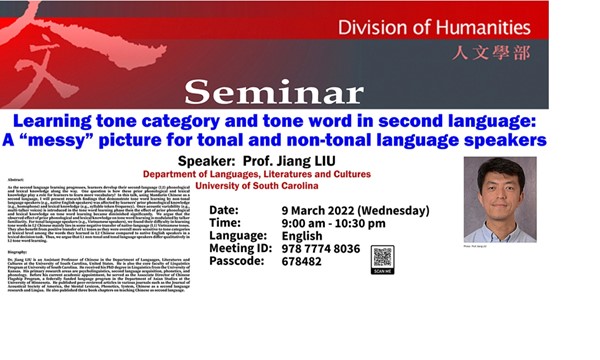Abstract:
As the second language learning progresses, learners develop their second-language (L2) phonological and lexical knowledge along the way. One question is how these prior phonological and lexical knowledge play a role for learners to learn more vocabulary? In this talk, using Mandarin Chinese as a second language, I will present research findings that demonstrate tone word learning by non-tonal language speakers (e.g., native English speakers) was affected by learners’ prior phonological knowledge (e.g., homophone) and lexical knowledge (e.g., syllable token frequency). Once acoustic variability (e.g., multi-talker voices) is introduced in the tone word learning phase then the effect of prior phonological and lexical knowledge on tone word learning became diminished significantly. We argue that the observed effect of prior phonological and lexical knowledge on tone word learning is modulated by talker familiarity. For tonal language speakers (e.g., Vietnamese speakers), we found their difficulty in learning tone words in L2 Chinese mainly lies in some negative transfer of native-language (L1) Vietnamese tones. They also benefit from positive transfer of L1 tones as they were overall more sensitive to tone categories at lexical level among the words they learned in L2 Chinese compared to native English speakers in a lexical decision task. Thus, we argue that L1 non-tonal and tonal language speakers differ qualitatively in L2 tone word learning.
Biography:
Dr. Jiang LIU is an Assistant Professor of Chinese in the Department of Languages, Literatures and Cultures at the University of South Carolina, United States. He is also the core faculty of Linguistics Program at U of SC. He received his PhD degree in Linguistics from the University of Kansas. His primary research areas are psycholinguistics, second language acquisition, phonetics, and phonology. Before his current academic appointment, he served as the Associate Director of Chinese Flagship Program, a federally funded language program in the Department of Asian Studies at the University of Minnesota. He published peer-reviewed articles in various journals such as the Journal of Acoustical Society of America, the Mental Lexicon, Phonetica, System, Chinese as a second language research and Lingua. He also published three book chapters on teaching Chinese as second language.
https://engage.ust.hk/event/7933073
